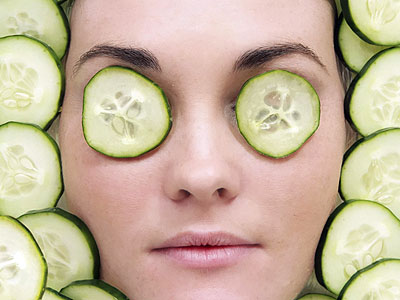
Do you ever wonder which home remedies actually work? In some cases, such as putting cool cucumber over your eyes to reduce puffiness, you have nothing to lose and everything to gain. But if you’re looking for relief from a serious and painful condition, like an ulcer or a urinary tract infection, it’s a good idea to know whether that home remedy has any evidence behind it. Here are some home remedies that could help—and those that probably won’t.
Cranberry juice to prevent urinary tract infections? Cranberry juice contains flavonoids and antioxidants, which may make it difficult for “bad” bacteria to grow and thrive in your body. Although some clinical trials have supported the idea that cranberry juice prevents a urinary tract infection, no hard and fast evidence exists. So, even though drinking cranberry juice might be refreshing and nutritious, if you do develop a urinary tract infection, you should see your doctor.
Cucumber slices for puffy eyes? One reason this idea works is that most people keep cucumbers in the refrigerator. That means they’re cold, and cold reduces swelling. When sliced, they also cover your eyes close to perfectly. Other people swear by cold tea bags as eye compresses, and that works for the same reason. Another option is to use a clean cotton ball to wipe cool skim milk on the affected skin.
Salt water gargle for a sore throat? If the flu or frequent throat or mouth infections have left your throat sore, you might try warm salt water gargles or rinses to feel better and help prevent another bout. Mix 1 teaspoon of salt in a large glass of water, gargle and spit.
Garlic for colds? Some people believe that eating a lot of garlic can help prevent or fight colds. Garlic won’t hurt you and could help your overall health. But the scientific jury is still out on whether increasing the amount of garlic you eat can actually give you an edge against colds.
Carrots for vision? Carrots (and other orange-colored fruits and vegetables) contain beta-carotene, a powerful antioxidant. In theory, eating a diet rich in beta-carotene helps your overall health, including your vision. And though it’s true that a healthy, balanced diet gives you the best chance of preserving your vision as you age, medical studies haven’t shown that beta-carotene supplements have much effect on eye health.
Milk for ulcers? That cold glass of milk looks like just the thing to calm your ulcer pain. And though milk might help you feel better briefly, it doesn’t actually help heal an ulcer, which is a small sore in the lining of the digestive tract. It’s also possible that, in the long run, drinking large amounts of milk could make ulcers worse by increasing the acid in your stomach, which irritates those tiny sores.
Baking soda as toothpaste? The American Dental Association (ADA) recommends toothpastes with fluoride to help remove plaque and prevent tooth decay. Rather than using baking soda, look for toothpaste with the ADA Seal. On the other hand, some health care professionals recommend baking soda mixed with salt as a mouth rinse, to help reduce mouth infections, especially for people whose immune systems are compromised. For this, mix 1/4 teaspoon of baking soda and 1/8 teaspoon of salt in 1 cup of warm water and rinse, followed by a rinse with plain water, several times a day.
Aspirin for tooth pain? Swallowing an aspirin or other over-the-counter painkiller can ease a toothache, but some people try to make a painful tooth feel better by putting the aspirin directly on the enamel. That’s not a good idea. This approach could cause a chemical burn to surrounding tissues, ultimately making pain worse and risking infection. Instead, try swallowing the aspirin and using a cold water rinse to manage the pain—and plan on seeing your dentist as soon as you can.
Drinking alcohol for pain management? Alcohol can relax you, and some people may drink because they have chronic pain. But regularly drinking alcohol to avoid pain can be bad for your health and can cause unpleasant or dangerous interactions with other pain-relieving medications your health care provider might give you.


Will there be a GLOW anniversary celebration at the ShoWare Center this year? If so, how can I be a vendor at the event? Thanks! I tried e-mailing Valley Medical’s general info but did not get a response. Any info would be appreciated.
Hi Sophia,
We will not be doing a GLOW anniversary celebration this year. Our plan is to do them every five years so the next big ShoWare event for GLOW will be in 2015.
Best,
Kim Blakeley